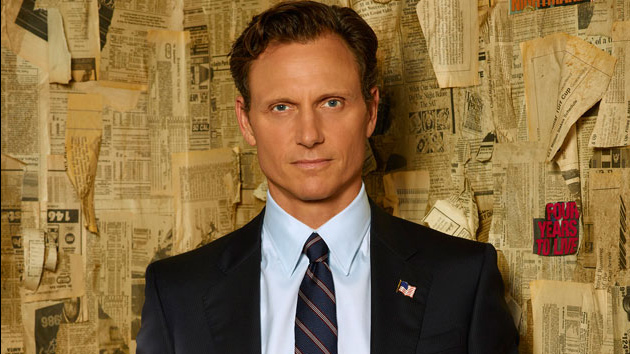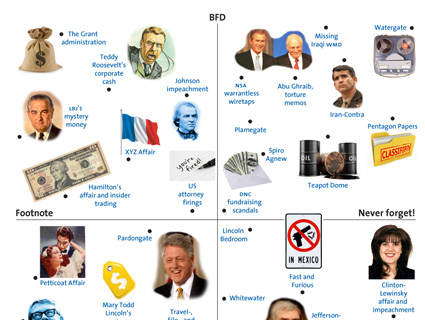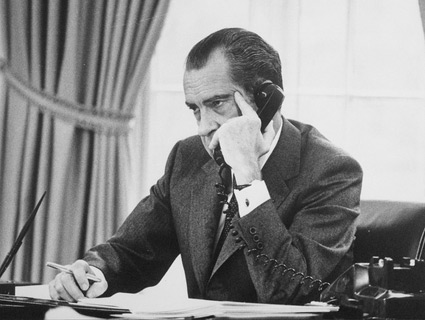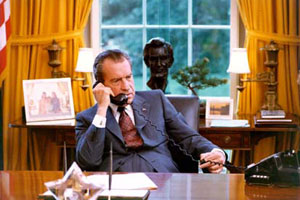The renowned satirist, actor, author, and musician Harry Shearer—you might know him as the bassist of Spinal Tap, the voice behind a panoply of Simpsons characters (Mr. Burns and Flanders among them), host of Le Show, and a former Saturday Night Live player—has done his share of presidential impersonations, but no subject has captured his imagination like Richard Nixon.
In Nixon’s the One, a series that first aired on British television and premieres October 21 as a YouTube series, the 70-year-old Shearer reenacts the follies of our 37th president word for word from Nixon’s secret Oval Office recordings. (In the exclusive clip above, Nixon and Chief of Staff H.R. Haldeman aide discuss how to destroy the networks, and come up with something that sounds a lot like Fox News.) The “comedy-drama,” cowritten by the distinguished Watergate historian Stanley Kutler, is pure unadulterated Nixon. And Shearer, a talented impersonator, has nailed the cringe-inducing, can’t-help-but-watch pathos of perhaps our oddest and most paranoid Oval Office inhabitant. I caught up with the actor last week to discuss his comic attraction to Tricky Dick, his favorite Simpsons character, and the one thing he can’t stand about The Daily Show.
You also can listen to the unabridged audio version* (~46 minutes):
Mother Jones: You spent a great deal of time researching and developing this project. What draws you to Nixon?
Harry Shearer: I’m drawn to him like a bunch of flies to a pile of fascinating comic characteristics. I grew up in Southern California, and Nixon was omnipresent. I have dim memories of actually seeing the “Checkers” speech, where he saved his vice presidential bid by making a very mawkish, lachrymose speech. He was accused of taking—here’s a quaint concept—illegal campaign contributions, and defended himself by saying, oddly enough, somebody gave us this dog, black and white checkered, and we’re gonna keep her. And that saved his bacon! And then, you know, he had this silly kitchen debate with Khrushchev; in 1958 he runs for president at the first televised debates and loses to John F. Kennedy; runs for governor of California two years later and has this remarkable press conference after he loses where he says, “You don’t have Nixon to kick around anymore,” and then, of course, spends the next six years running for president.
MJ: Being kicked around!
HS: And kicking around. And so he sort of stood above and beyond the normal creepy politician. The first thing I was aware of as a kid was his hardball, if not mudball, politics. You may remember this cartoon by Herblock in the Washington Post which had Richard Nixon crawling up from down below in the sewer, followed shortly after by a picture of Nixon with just the words, “Would you buy a used car from this man?” Nixon with his endemic five o’clock shadow!
MJ: So it was essentially his creepiness that attracted you?
HS: That was the first thing. But then it became obvious that there were really funny characteristics about this guy, chief of which would be that he seemed to devote about 85 percent of his waking energy to suppressing any sign of his emotional response to anything that was going on around him, and the other 15 percent blurting out those authentic responses in the silliest and most inopportune ways. And he had these smiles that would come at the most inappropriate times—just flashes that there was an inner life screaming to get out.
MJ: Are you saying that he had more pathos than the average president?
HS: No, not more pathos. More—if the cortex is just a series of twists and bends and folds, he had more folds. [Laughter.]
[Listen to an unedited audio clip of the previous exchange:]
MJ: How long did it take you to feel you really had him nailed?
HS: I’ve been doing Nixon pretty much my whole professional life. I was in this comedy group called the Credibility Gap in Los Angeles when he was president. I was doing Nixon on the radio, and when we did live shows I physicalized him—if that’s a word—for the first time. And then I did a Nixon sketch on a very short-lived NBC show called Sunday Best. It was Nixon as a guest on an infomercial, where he was demonstrating a teeth-whitening miracle product. It was an opportunity to do full Nixon makeup and do the whole body, and a really great moment for me to see how far along I was.
MJ: Did you see any traits this time around that you hadn’t captured in your earlier impersonations?
HS: Yeah. I did emphasize more something that I’d never seen anybody capture, which is, for a guy who is always banging on about the masculine virtues, he had this remarkable proclivity for very dainty gestures. If you go look at that iconic moment where he’s standing on the bridge of the helicopter about to get in after he’s resigned, and he gives a salute, it isn’t a crisp, military salute at all. His hand is sort of like this butterfly flying away from his forehead. And he would purse his lips, he would flutter his eyelashes—there were a lot of these kinds of gestures.
MJ: Nixon has been satirized by Philip Roth in Our Gang. Anthony Hopkins played him in Oliver Stone’s Nixon, Frank Langella in Ron Howard’s Frost/Nixon. Dan Aykroyd did him early on in SNL.
HS: With a mustache!
MJ: Indeed.
HS: For added verisimilitude.
MJ: Who do you think has done him best or worst, mustaches aside?
HS: I’m not going to get into that. I saw a little bit of Anthony Hopkins after we did our show out of curiosity—I’m not a big Oliver Stone fan. But even sighted men have different versions of the elephant. And this is my version.
MJ: One of your most harrowing scenes covers the minutes before Nixon’s televised resignation speech. It really makes you cringe as Nixon nervously attempts to make jokey small talk with the television crew. Did you do anything special to prepare for that very emotional scene?
HS: It’s interesting. That is the one scene that is not from the White House taping system he installed. It was videotaped by an anonymous CBS engineer, and that tape circulated around in many bootleg versions of really dire video quality. When I went to the repository of the Nixon tapes at the National Archives, I befriended one of the guys there, and I said, “You know that tape?” And he said, “Oh, yeah, we have a great broadcast-quality version of it.” And so I managed to get a copy. And for years I would watch that tape with friends, and I’d memorized that scene long since. We’d recite it along with watching it—it was just such a wonderful moment.
MJ: [Laughs.] Is that what you do for fun in the Shearer household?
HS: Instead of betting on football! But—this sounds like goofy actor talk— having lived with that scene for all these years, the closest I could come to understanding it was the following: Here’s a guy who had no gift for small talk, never liked to be around strangers, was physically awkward, and he goes into the one business that calls for ease with strangers and a gift for small talk. And he manages through sheer determination—let’s be Horatio Algeristic about it—to rise to the top of the greasiest pole in America. And now he has to climb off that pole in humiliation and mortification. And what does he do in this room for these eight minutes? He engages in small talk.
I just thought it was ironically goofy. Then, while we were making this series, I happened upon a memoir by a midlevel White House staffer, and he had been in the room that night. This guy’s memoir told me what Nixon’s last words were. And they were, on August 8, 1974, to the crew: “Have a Merry Christmas, fellas!” That was just so bizarre.
Now we’re rehearsing the scene, and suddenly it came to me what was going on. This was the beginning of his next campaign! This night was to become the beginning of his campaign for rehabilitation. In his mind, all those crew members were going to walk out of there saying, “He wasn’t bothered. He wasn’t angry. He wasn’t upset. He was the nicest guy. He was making jokes, he even wished us a Merry Christmas!”
MJ: Christmas in August?
HS: He wanted them to remember him at Christmastime. He was planning little seeds of his rehabilitation. That’s my theory.
MJ: Listening to so many of these Nixon tapes that never made a lot of news, what other new gems did you discover?
HS: I wasn’t looking for newsworthy material. My partner, Stanley Kutler—the historian whose life has been steeped in these tapes and who filed the lawsuits that made them public—we were looking for the character stuff, the stuff that made us laugh. I’m not sure there are any bombshells left.
MJ: Well, did you learn anything new about Nixon?
HS: I couldn’t help but be struck that this guy I had thought was the embodiment of everything wrong with American politics, a lot of his domestic policy was mind-numbingly, head-spinningly to the left of Obama’s. It was under Nixon that the EPA was created. It was under Nixon that OSHA was created. Under Nixon that the Clean Air and Clean Water Acts were passed. He wasn’t necessarily leading the parade, but they did happen during his administration. And he actually gave a speech late in his truncated second term advocating a guaranteed annual income for all Americans.
MJ: Sounds like a commie!
HS: Imagine the number of drugs you’d have to administer to Obama to get him to make that speech!
MJ: Or any Democrat. Nancy Pelosi. Harry Reid. Even Paul Krugman wouldn’t advocate that, or at least I don’t think so.
HS: Even Bernie Sanders probably wouldn’t! If Nixon were a Republican senator today, he would have been primaried out.
MJ: Did you feel any sympathy for the man as you spent hours putting on makeup to look like him and produce these hours of reenactments?
HS: I wouldn’t say sympathy. Because sympathy implies you’re taking his side in things.
MJ: Empathy?
HS: Empathy gets a little closer to it. You know, I came up working for Jack Benny—I was a child actor. I think through osmosis I kind of got what his comic genius was about. If one recalls Jack Benny’s comic persona, he was not a nice man. He was vain, he was miserly, he was a bad boss, all characteristics we would regard as unlikable, and yet he was a lovable performer, because he was portraying the very flawed humanity of that character. And I wasn’t playing Nixon’s satirical stick figure. I was playing Nixon the man. As an actor, I felt I had to get to the deeply flawed humanity of the guy. Here’s the eerie part: We were word accurate. We did our own transcripts. We actually hired John Dean’s transcriber.
MJ: And some of these tapes are hard to make out.
HS: Oh, they’re incredibly difficult. We hired someone who is skilled at that and even she had “inaudibles” and guesses at words. I have these digital sound-processing tools so, as we were rehearsing, the cast and I would discuss these phrases that just didn’t sound quite right. And I’d run the tape again through more of these tools, and almost magically words would pop out. And all of a sudden, Oh my God, that’s what he’s saying!
We had more script revisions than a troubled sitcom. The script supervisor would come around after what we thought was a great take and say, well, you moved this word or you paraphrased this. And I would curse her, but we’d do it again. And strangely enough, the takes where I got the words absolutely right, true to the transcript, were the performances that I felt and looked most Nixonian. Getting to his weird word choices and the weird word order and the repetitions and the backtracking that make it impossible almost to memorize got me closer to that guy.
MJ: Did you find that he had his own unique internal logic?
HS: Absolutely. When Nixon died, on my radio show I started doing sketches with three basic conceits: One, there’s a place called Heaven. Two, Nixon got in. And three, he’s still taping. I was writing these sketches and trying to approximate the way he and Haldeman would jump over each other and race to confirm each other and then race to negate each other, and Nixon’s way of expressing himself. So by the time we’re doing the real stuff, I felt so familiar with that inner world of his. The relationship with Kissinger is so funny and goofy we made a whole episode out of it. Kissinger was everything Nixon hated: a Harvard professor and a Jew and an intellectual. And Kissinger knew it. But the offer to be in a position of power was so intoxicating that he put up with all that shit.
Especially in the Kissinger scenes, Nixon would repeat the word “never” as if on a loop: “There’s never gonna be people from Harvard invited into this White House ever again. Never. Never. Never.” And he’s saying this right to Henry’s face, knowing that every time it’s a little pinprick into Kissinger’s gut. He did that on several occasions. You hear the “never, never, never” partly, I think, because Nixon knew that so many of the crazy things he told his staff to do they would ignore. There’s a scene in the pilot episode where he tells Haldemann flat out, “Destroy the tapes!” and he says, “Can you do that?” and Haldemann nods and says, “Yes.” Of course, the tapes aren’t destroyed.
There’s another scene where he’s bitching about how he never got invited to a social occasion at the White House when Kennedy was president. Now, Kennedy is long dead by this point, and this is still burning deep within Nixon. That’s one of the things that I think is one of the darkly comic parts of his character. He just couldn’t let go of these resentments.
MJ: What was the response to the series in England?
HS: It got a great critical response.
MJ: You know how they love to feel superior to us.
HS: Yes, and sometimes they’re right. But I was thinking about why the show could get made there with this sort of creepy accuracy and couldn’t get made here. I just imagined if I’d been in the office of an American highfalutin’ cable channel, there would’ve been meetings that started with, “We know he didn’t like black people, but did he have to hate Jews too?” And I wanted to avoid those meetings. I think the British learn their history through the prism of this gallery of grotesques known as the royals.
MJ: Who are easy to caricature.
HS: Drawing as well as acting. So in some ways, Brits just saw him as another one of those, except without a crown. Whereas in this country, at least when I was growing up, we learned our history almost as lives of the saints. And it came as a shock, “Oh, Jefferson had slaves?” It always comes as a shock to us that elevation to the White House didn’t somehow cleanse them of all their deep character flaws.
MJ: Does the fact that Nixon attained the highest office in the land say something about America?
HS: Every president that makes it up there says something about the country. I think Nixon says a lot about those times. It was possibly hard, in the ’90s and early 2000s to understand the grip of fear that communism had on the country in the 1950s and 1960s—a fear Nixon rode like a endless great wave on the Pacific to high office. I’m sure, though there’s no evidence of it, one of the things that rankled him down deep was that it was called McCarthyism and not Nixonism.
MJ: He should’ve trademarked it.
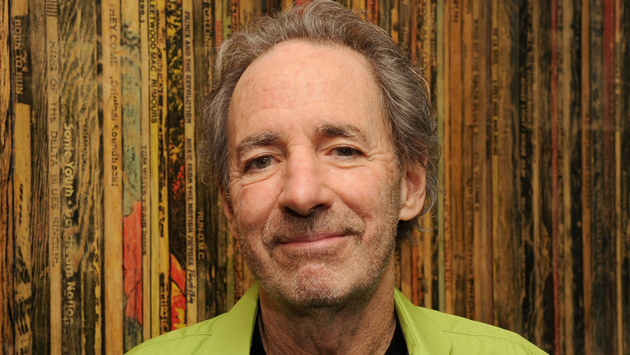
HS: But now, in the grip of a very similar wave involving terrorism, we’ve succeeded in a far greater receding of our civil liberties in the name of avoiding an enemy much less powerful than the enemy when we were afraid of with communism. Yet that fear propelled Nixon to the White House. Nixon’s genius was that he was able to portray himself as the toughest of the anti-communists, and yet run on a platform that he had a plan to end the Vietnam War. And, of course, his plan was to prolong it until his second election—but he didn’t tell us that then.
MJ: Is there any other president you’d like to play?
HS: Well, I’ve, on my radio show I’ve played every one since—
MJ: How’s your Garfield?
HS: Poor. But who’s to know?
MJ: Good point.
HS: My Franklin Pierce is spot on. But I’m not sure that there’s anybody else that’s as psychologically complex and who’s given us this window into his soul that Nixon gave us. That’s what I find absolutely addictive and seductive.
MJ: You’re the voice of many characters on The Simpsons: Mr. Burns, Smithers, Flanders, and probably 27,000 others. Stupid question: Do you have a favorite?
HS: Stupid answer: C. Montgomery Burns. [Watch the following clip of Shearer reading a scene:]
MJ: Is there a Nixonian quality to Mr. Burns?
HS: Burns is much purer evil than Nixon was. I think it’s the purity of his evil that attracts me as a comic character.
MJ: Will The Simpsons ever end, and if so, what should happen in the finale?
HS: As they say in Washington, above my pay grade. But I’ve long had an answer to the first question, which is that The Simpsons will end as soon as Fox is able to find an 8 p.m. comedy hit to replace it—so I give us another 50 years.
MJ: Long may you wave.
HS: Thank you.
MJ: Is it true that Spinal Tap is reuniting to do a collection of Crosby, Stills & Nash covers?
HS: It’d be great! But sadly, no. I think you can look for a Crosby, Stills & Nash reunion doing Spinal Tap covers before you look for the other.
MJ: I’d like to see that! So, looking around at the state of political satire—SNL, Jon Stewart, Stephen Colbert, etc.—how would you say the form is faring today?
HS: Well, I will say one thing that all those shows have in common, which I find sad, if not reprehensible. Satire is an art best practiced behind the back of the intended target. I think inviting politicians on a satirical show becomes a very big trap. Because one of two things happen: Either you have to kind of unsharpen your fangs because you can’t be quite as cruel to people to their face as you are behind their backs…
MJ: When you have the Pakistan dictator on, you kind of yuk it up with him.
HS: Yeah. Or you don’t defang, and those guests get the word and they stop coming. I think the former has happened in all three cases. I remember when Christopher Guest and Marty Short and I joined SNL in 1984. And we said to Dick Ebersoll, then the producer, “This show is established. We can get our own ratings. We don’t need these guests that can’t do comedy and are often politicians—everything kind of gets distorted by that.” In fact, the first show of that season had no guest host. And we thought “Okay, great!” And by show three, our guest host was Jesse Jackson, and he had moved half of Operation Push into our office so they could make free long-distance calls.
MJ: He did Green Eggs and Ham on SNL and it was very funny.
HS: Yeah, I just think everyone knows you go on those shows if you’re a politician to, “humanize yourself”—to show, “Hey, I can take a joke.” Well, why should satire be in the service of humanizing these people who are supposed to be the target of our venom and vitriol? I think that’s unseemly.
MJ: So many political satirists seem to be on the liberal side of the equation. Are there any great humorists out there with a conservative bent?
HS: Yeah, sure. PJ O’Rourke has been funny and conservative for years. I find myself being lumped in with the left, though I’m as critical of Obama as I have been of any president. I think it’s the satirist’s job to be critical of—the cliché—the guys with the monopoly on the guns. In the United States you have to amend it to say the guys with the majority of the guns. Or the bigger guns. But I think that’s the gig. Otherwise you become a court jester. You become the satirist who ended up writing jokes on the side for one of the recent presidential candidates. Well, now you’re really a hired gun. You’re just comedy oppo research.
Editor’s note: In the audio, Shearer attributes the “used car” poster to Herblock. It actually was produced by the Kennedy campaign.


